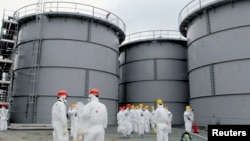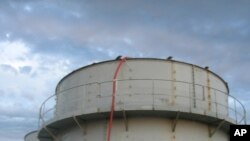BANGKOK —
Leaking radioactive water at Japan’s failed Fukushima nuclear plant is raising worries over whether attempts to stabilize the facility are instead creating a new disaster. This week Japan’s nuclear watchdog classified leaking water from a holding tank as a “serious incident.”
Workers at the troubled Fukushima nuclear plant have been building hundreds of tanks to hold many thousands of tons of radioactive water on the site. But this week regulators discovered that 300 tons of water has leaked, raising concerns about the rest of the holding tanks.
Japan’s Nuclear Regulation Authority chairman Shunichi Tanaka compares the situation with the tanks to a haunted house at an amusement park, where alarming things can happen in rapid succession.
“We have to look into how to reduce the risk and how to prevent it from becoming a fatal or serious accident," he said.
Earlier this week, the plant's operator, Tokyo Electric Power Company (TEPCO), announced that the 300 tons of water that leaked from one tank was so contaminated that a person standing nearby would receive a 100 millisieverts dose of radiation in one hour, five times the annual limit for nuclear workers.
TEPCO said the cause of the leak is unknown.
Greenpeace Japan spokesperson Hisayo Takada said the greatest long-term concern is the possibility for groundwater contamination. Some 400 tons of groundwater flow through the plant every day. She said that so far, the containment strategies for irradiated material at Fukushima are temporary and do not prevent radiation from spreading.
"The Tepco solution so far, but it's now maybe no longer working or no longer possible to begin with. So, A: stop the current leaking. 2: to make that leaking not to go into the ocean, second thing. Third stop the ground water, find a way to stop the groundwater," Takada said.
William Saito, a member of the national diet’s Fukushima investigation committee, said the challenge of disposing of the enormous amount of contaminated water is unprecedented. But he said they must be more transparent about the cleanup effort.
"To be fair to TEPCO most companies in a similar situation would be overwhelmed. The problem that they're suffering that's making things worse is that because of a lack of transparency, they're trying to internalize these issues. Whereas if you're a little more forthcoming and asking for help, whether it's the national government or from other perhaps professionals from around the world this might have been handled differently," he said.
This incident marks the first warning on the International Nuclear Event Scale since an earthquake and tsunami caused three reactors to melt down in 2011, which was rated the maximum level, seven, the worst since Chernobyl in 1986.
Workers at the troubled Fukushima nuclear plant have been building hundreds of tanks to hold many thousands of tons of radioactive water on the site. But this week regulators discovered that 300 tons of water has leaked, raising concerns about the rest of the holding tanks.
Japan’s Nuclear Regulation Authority chairman Shunichi Tanaka compares the situation with the tanks to a haunted house at an amusement park, where alarming things can happen in rapid succession.
“We have to look into how to reduce the risk and how to prevent it from becoming a fatal or serious accident," he said.
Earlier this week, the plant's operator, Tokyo Electric Power Company (TEPCO), announced that the 300 tons of water that leaked from one tank was so contaminated that a person standing nearby would receive a 100 millisieverts dose of radiation in one hour, five times the annual limit for nuclear workers.
TEPCO said the cause of the leak is unknown.
Greenpeace Japan spokesperson Hisayo Takada said the greatest long-term concern is the possibility for groundwater contamination. Some 400 tons of groundwater flow through the plant every day. She said that so far, the containment strategies for irradiated material at Fukushima are temporary and do not prevent radiation from spreading.
"The Tepco solution so far, but it's now maybe no longer working or no longer possible to begin with. So, A: stop the current leaking. 2: to make that leaking not to go into the ocean, second thing. Third stop the ground water, find a way to stop the groundwater," Takada said.
William Saito, a member of the national diet’s Fukushima investigation committee, said the challenge of disposing of the enormous amount of contaminated water is unprecedented. But he said they must be more transparent about the cleanup effort.
"To be fair to TEPCO most companies in a similar situation would be overwhelmed. The problem that they're suffering that's making things worse is that because of a lack of transparency, they're trying to internalize these issues. Whereas if you're a little more forthcoming and asking for help, whether it's the national government or from other perhaps professionals from around the world this might have been handled differently," he said.
This incident marks the first warning on the International Nuclear Event Scale since an earthquake and tsunami caused three reactors to melt down in 2011, which was rated the maximum level, seven, the worst since Chernobyl in 1986.












